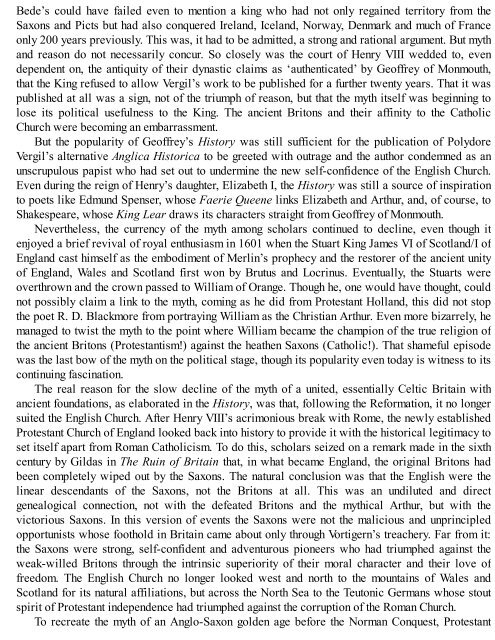You also want an ePaper? Increase the reach of your titles
YUMPU automatically turns print PDFs into web optimized ePapers that Google loves.
Bede’s could have failed even to mention a king who had not only regained territory from the<br />
Saxons and Picts but had also conquered Ireland, Iceland, Norway, Denmark and much of France<br />
only 200 years previously. This was, it had to be admitted, a strong and rational argument. But myth<br />
and reason do not necessarily concur. So closely was the court of Henry VIII wedded to, even<br />
dependent on, the antiquity of their dynastic claims as ‘authenticated’ by Geoffrey of Monmouth,<br />
that the King refused to allow Vergil’s work to be published for a further twenty years. That it was<br />
published at all was a sign, not of the triumph of reason, but that the myth itself was beginning to<br />
lose its political usefulness to the King. The ancient Britons and their affinity to the Catholic<br />
Church were becoming an embarrassment.<br />
But the popularity of Geoffrey’s History was still sufficient for the publication of Polydore<br />
Vergil’s alternative Anglica Historica to be greeted with outrage and the author condemned as an<br />
unscrupulous papist who had set out to undermine the new self-confidence of the English Church.<br />
Even during the reign of Henry’s daughter, Elizabeth I, the History was still a source of inspiration<br />
to poets like Edmund Spenser, whose Faerie Queene links Elizabeth and Arthur, and, of course, to<br />
Shakespeare, whose King Lear draws its characters straight from Geoffrey of Monmouth.<br />
Nevertheless, the currency of the myth among scholars continued to decline, even though it<br />
enjoyed a brief revival of royal enthusiasm in 1601 when the Stuart King James VI of Scotland/I of<br />
England cast himself as the embodiment of Merlin’s prophecy and the restorer of the ancient unity<br />
of England, Wales and Scotland first won by Brutus and Locrinus. Eventually, the Stuarts were<br />
overthrown and the crown passed to William of Orange. Though he, one would have thought, could<br />
not possibly claim a link to the myth, coming as he did from Protestant Holland, this did not stop<br />
the poet R. D. Blackmore from portraying William as the Christian Arthur. Even more bizarrely, he<br />
managed to twist the myth to the point where William became the champion of the true religion of<br />
the ancient Britons (Protestantism!) against the heathen Saxons (Catholic!). That shameful episode<br />
was the last bow of the myth on the political stage, though its popularity even today is witness to its<br />
continuing fascination.<br />
The real reason for the slow decline of the myth of a united, essentially Celtic Britain with<br />
ancient foundations, as elaborated in the History, was that, following the Reformation, it no longer<br />
suited the English Church. After Henry VIII’s acrimonious break with Rome, the newly established<br />
Protestant Church of England looked back into history to provide it with the historical legitimacy to<br />
set itself apart from Roman Catholicism. To do this, scholars seized on a remark made in the sixth<br />
century by Gildas in The Ruin of Britain that, in what became England, the original Britons had<br />
been completely wiped out by the Saxons. The natural conclusion was that the English were the<br />
linear descendants of the Saxons, not the Britons at all. This was an undiluted and direct<br />
genealogical connection, not with the defeated Britons and the mythical Arthur, but with the<br />
victorious Saxons. In this version of events the Saxons were not the malicious and unprincipled<br />
opportunists whose foothold in Britain came about only through Vortigern’s treachery. Far from it:<br />
the Saxons were strong, self-confident and adventurous pioneers who had triumphed against the<br />
weak-willed Britons through the intrinsic superiority of their moral character and their love of<br />
freedom. The English Church no longer looked west and north to the mountains of Wales and<br />
Scotland for its natural affiliations, but across the North Sea to the Teutonic Germans whose stout<br />
spirit of Protestant independence had triumphed against the corruption of the Roman Church.<br />
To recreate the myth of an Anglo-Saxon golden age before the Norman Conquest, Protestant
















